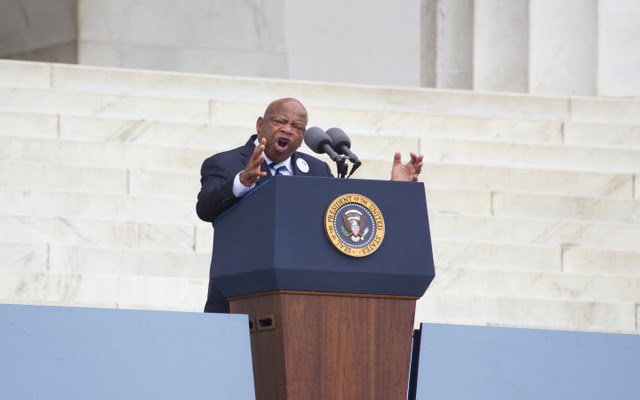Quck answer
John Lewis was a prominent civil rights leader and politician in the United States. He dedicated his life to fighting for equality and justice for all people, regardless of their race or background. Lewis was one of the “Big Six” leaders of the Civil Rights Movement in the 1960s and played a key role in organizing the March on Washington in 1963. He was also a member of the U.S. House of Representatives for over 30 years, representing Georgia’s 5th congressional district. Throughout his career, Lewis remained committed to nonviolent protest and was a strong advocate for voting rights. His legacy continues to inspire and influence future generations in the ongoing struggle for civil rights.

What drives your passion? Are you interested in preserving the environment? How about ensuring access to clean water for all? Maybe your biggest concern is treating every individual with fairness and equality. Young individuals like yourself are making a positive impact in the world each day. This has been happening for quite some time now. Searching for a role model? Look no further! Continue reading to discover more about the central figure of today’s Wonder of the Day—John Lewis.
John Lewis was born on February 21, 1940. He grew up in a rural area near Troy, Alabama. Lewis’s parents worked as sharecroppers, and he started helping out on the farm from a young age. As an African American, Lewis experienced racial discrimination from an early stage. When he was a child, he attempted to obtain a library card but was turned away. The librarian told Lewis that the books were only for White individuals.
During his teenage years, Lewis found inspiration in Dr. Martin Luther King, Jr. after hearing him speak on the radio. He absorbed Dr. King’s words and felt compelled to take action. Lewis became a Freedom Rider to aid in the desegregation of public buses in the United States. He also led sit-ins to protest against segregation in other public spaces.
While fighting for equality, Lewis also pursued higher education. He attended the American Baptist Theological Seminary in Nashville, where he gained a deeper understanding of protest methods and helped integrate lunch counters. He went on to earn a bachelor’s degree in religion and philosophy from Fisk University. In 1963, Lewis became the youngest speaker at the first March on Washington, when he was just 23 years old.
John Lewis displayed immense courage in the face of hatred and violence. In 1965, he played a significant role in leading a march in support of voting rights. The marchers set off from Selma, Alabama on March 7, with their destination being Birmingham. However, when they reached the Edmund Pettus Bridge, they were met with a large police force.
The police attacked the 600 marchers, beating them with clubs and using tear gas. Fourteen people were killed, and many others sustained injuries. This event became known as Bloody Sunday. Lewis was severely beaten, suffering from a skull fracture and other injuries. He later admitted that he believed he would die that day.
Did this deter John Lewis? Absolutely not. He continued to fight for equal rights. His efforts played a crucial role in the enactment of the Voting Rights Act of 1965. Later on, he led the Voter Education Project (VEP) and helped millions of individuals register to vote.
Lewis was elected to the United States House of Representatives in 1986. While serving in office, he persistently worked towards achieving equality. Many referred to him as “the conscience of the U.S. Congress” due to his unwavering dedication to human rights.
As an adult, Lewis also dedicated himself to inspiring the younger generation. He wrote a series of graphic novels chronicling his experiences as a civil rights activist. In fact, he even received the National Book Award for the third book in this series.
Lewis was also honored with the Presidential Medal of Freedom in 2011 by President Barack Obama. Additionally, he received honorary doctorate degrees from Brown University, Harvard University, and the University of Connecticut. In 2019, Lewis revealed that he had been diagnosed with pancreatic cancer. He passed away on July 17, 2020.
Following the death of John Lewis, the congressman’s posthumous essay was published by the New York Times. In the essay, he encouraged people to follow their true beliefs and answer the highest calling of their hearts. He specifically urged young people to take action, as they filled him with hope for the future of America’s story.
What is the greatest calling of your heart? How can you translate John Lewis’s words into action in your own life? Take some time today to contemplate the world around you. How will you contribute to making it better?
Give It a Try
Seek out an adult who can assist you with the activities below!
- Identify your strongest passions. How can you utilize those passions to improve the world? Discuss these questions with a friend or family member today. Then, explore ways to employ your talents and passions to make a positive impact on the world. Create a list of actions you can start taking today to support the causes you believe in.
- Visualize John Lewis’s life through images. Then, summarize your findings for a friend or family member. Share at least three of Lewis’s accomplishments during his lifetime.
- Devote some time today to learn about another Civil Rights Icon. Afterwards, write a letter to the person you researched. Highlight the most intriguing aspects of their life and pose any questions you may have. If the person is still alive, ask an adult to help you send your letter.
Sources of Inspiration
- https://www.aclu.org/congressman-john-lewis (accessed 14 Sept. 2020)
- https://www.britannica.com/biography/John-Lewis-American-civil-rights-leader-and-politician (accessed 14 Sept. 2020)
- https://www.thoughtco.com/john-lewis-civil-rights-activist-45223 (accessed 14 Sept. 2020)
- https://www.biography.com/political-figure/john-lewis (accessed 14 Sept. 2020)
- https://www.cnn.com/2020/07/30/politics/john-lewis-essay-new-york-times/index.html (accessed 14 Sept. 2020)





Leave a Reply